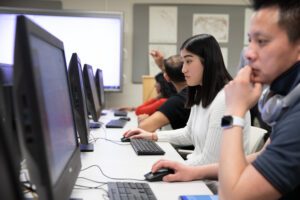 In response to students and faculty increasingly expressing interest in knowing more about the research process and AI, TMU Libraries has launched a new badging program on AI Fluency. The program focuses on AI as it relates to research, information-seeking, verification, citation, and best practices for transparency.
In response to students and faculty increasingly expressing interest in knowing more about the research process and AI, TMU Libraries has launched a new badging program on AI Fluency. The program focuses on AI as it relates to research, information-seeking, verification, citation, and best practices for transparency.
“The interest in generative AI workshops from TMU Library has been widespread from students and faculty,” says Reece Steinberg, head of Library Learning Services at TMU Libraries. “We developed this program to help guide participants in applying their own ethics in using these tools as the tools continue to change and grow in significance in their learning and life.”
AI tools are already being leveraged for efficiency, but students are using them to gain a deeper understanding of a topic, as well as for creative development. They use AI to quiz themselves, break down challenging concepts, and generate additional examples that facilitate understanding. Students are also employing AI to brainstorm ideas for assignments and projects, and develop custom case studies to be worked through.
Ethical use of tools is a concern, particularly when it comes to course work. Requirements on use vary from course to course, and students need to adhere to the course guidelines. Where the Libraries’ new workshops come in, is in providing guidance on transparency in use. AI can be very powerful in helping to enhance critical thinking, build problem solving and query skills
As AI relates to the process of researching, there are tools embedded in search systems to synthesize information, answer questions, brainstorm related topics, and assist with actual search terms. Learning more about these tools and how they can assist in the research process are some of the reasons why librarians took on developing these workshops.
The two core workshops of the new badging program are: Artificial Intelligence: Delegation & Description, and Artificial Intelligence: Discernment and Diligence.
These workshops intend to help students, as well as all interested members of the university community, learn to use GenAI tools effectively and thoughtfully—or to choose not to use them at all.
The workshops focus on building a robust, tool-agnostic skill set rather than a simple step-by-step guide. In the Delegation & Description workshop, participants learn to define overarching goals or projects, break them into tasks, and decide which ones to delegate to Generative AI. This involves gaining experience in comparing and contrasting different large language model chatbots and trying various techniques to improve GenAI outputs through effective prompting.
The Discernment and Diligence workshop focuses on critical evaluation. Students learn how to determine if GenAI outputs meet their needs, while gaining experience with the necessity of transparent use of GenAI, which includes proper sourcing and citation practices.
“We recognize students hold a wide variety of viewpoints when it comes to AI, and we see that as a strength,” says Steinberg. “The workshops emphasize transparency in use of AI and discuss practices like citation and AI use statements.”
While the program highlights a range of tools available to the community, such as Gemini and library databases that integrate generative AI, its primary focus is on cultivating a thoughtful and adaptable approach to working with GenAI. “These workshops invite students to learn practical skills while thinking about and exercising their own ethics to meet the goals they set for themselves academically, professionally and in life,” says Steinberg.
The AI Fluency program encourages students to develop critical thinking habits and ethical awareness that can be applied to any large language model chatbot. In doing so, it empowers learners to become more confident using AI, even as the tools and technologies change.